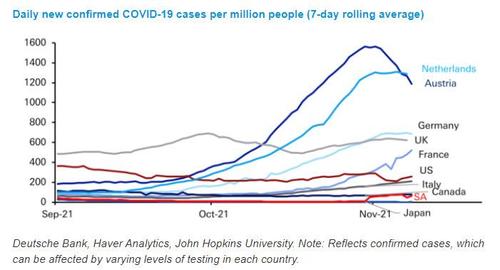Germany Imposes Strict Curbs On Unvaccinated, Limits Gatherings, Will Mandate Covid Shots
Confirming several days of rumors and speculation, moments ago Germany imposed stringent nationwide restrictions on people who aren’t vaccinated against Covid-19 and limited attendance at soccer games and other public events to check the latest surge in infections which naturally should not be happening as most of Germany is vaccinated and wearning masks. But let's just keep doing more of what hasn't worked.
According to Bloomberg, in one of her final acts as chancellor, Angela Merkel held talks with her incoming successor, Olaf Scholz, and Germany’s 16 regional premiers on Thursday, where they agreed on new curbs including allowing only people who are vaccinated or recovered into restaurants, theaters and non-essential stores.
“We are seeing something of an easing but at a level that’s far too high,” Merkel said in Berlin. “That’s why we needed to agree these measures today.”
The politicians also backed a plan to make Covid shots compulsory, saying that the lower house of parliament would vote on it soon.
A vaccine mandate is merely the latest flipflop from those in control and marks a major departure after Merkel and other officials insisted shots would be a personal choice. The soft tone may have contributed to Germany’s relatively tepid uptake, with less than 70% of the population fully inoculated. As a reminder, just a few months ago 60% was viewed as the herd immunity threshold. But with government drunks with power and desperate to extend their control, numbers are changing day by day.
The bulletin below summarizes the latest pandemic responses in Germany
New Curbs
- Access to restaurants, theaters only for vaccinated, recovered
- Access to non-essential stores only for vaccinated, recovered
- Tighter contact restrictions for non-vaccinated people
- Nightclubs closed in places with high infection rates
- Limits on number of spectators at large public events
Vaccine Push
- Parliament to vote on general vaccine mandate
- Covid shots to be required for hospital and care-home employees
- Increase pool of people who can administer vaccines
- As many as 30 million shots to be administered by the end of the year
Merkel's replacement and current vice chancellor, Olaf Scholz, is expected to be sworn in on Wednesday after more than two months of coalition negotiations, and the change in power has slowed Germany’s response to a resurgence in the pandemic.
Despite the growing urgency as hospitals fill up, authorities were keen to avoid blanket curbs and close schools. The new measures include tighter contact restrictions for non-vaccinated people, shutting nightclubs in places with high infection rates and strict limits on the number of spectators at large public events.
The agreement makes the guidelines national. Some regions with high infection rates like Bavaria and Saxony had already tightened restrictions, and states continue to have the authority to clamp down harder locally.
Curiously the escalation comes amid some recent good news, with Germany’s infection rate slipping for a third straight day, however medical officials have warned that the situation remains serious.
The head of the DIVI intensive-care lobby predicted on Wednesday that the number of Covid patients in ICUs will reach 6,000 by Christmas, exceeding the previous record. Thursday’s level of 439.2 cases per 100,000 people over the past seven days is still more than double the peak in the spring.
To protect more people, authorities want to administer as many as 30 million vaccine doses by the end of the year, including boosters. Officials also want to significantly expand the pool of people who can give shots, including using qualified workers in drug stores and care facilities.
via IFTTT
InoreaderURL: SECONDARY LINK

